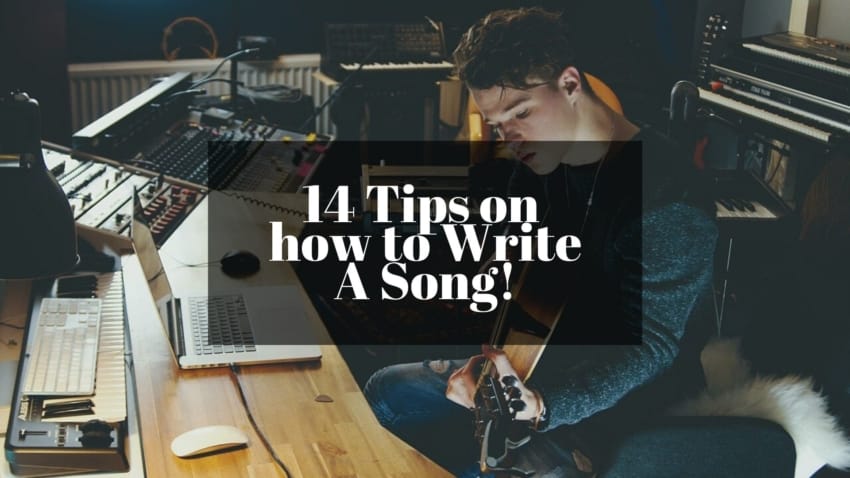Last updated on February 12th, 2021 at 12:15 pm
One of the things that I’ve always struggled with the most, and I know that this is also something that most people have issues with, is writing songs and avoiding writer’s block.
Having said that, there’s a couple steps you could take in order to make the writing process a bit easier.
In this post I will list the 14 steps that actually helped me become better, and I think that you will also be able to take advantage of them and over time become a better songwriter overall.
At the end I will include a free downloadable PDF Songwriting Checklist that you should absolutely get.
Let’s get started with the first tip which is;
1. Record ideas on your phone
If there is just one tip that I can’t stress enough, it’s this one.
You always need to record the ideas you like, and now that we all have smartphones that can record whatever we want at any time, it’s actually quite easy to do.
I can’t tell you how many times I’ve had an idea that I really liked and I just forgot about it five minutes later.
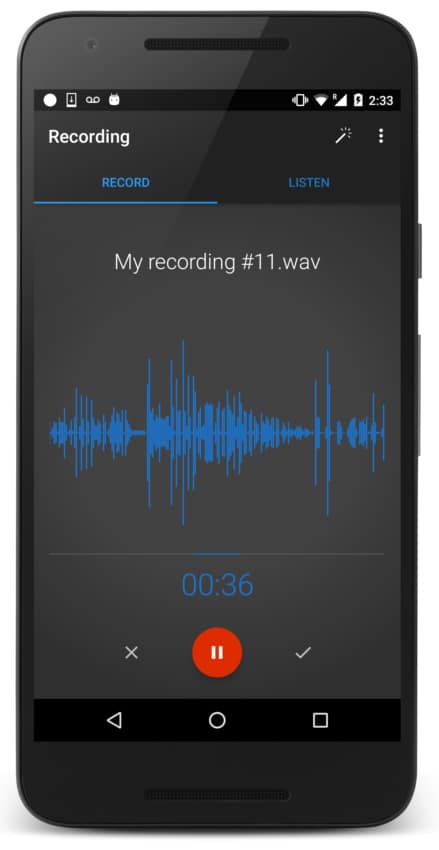
This is extremely frustrating and it’s something that happens a lot to me and to everyone I talked to about how to write songs.
Decades ago, it was a bit harder to do, but with today’s technology this has become easier than ever, so please record every idea, melody, lyric, or whatever you come up with!
2. Start with what you’re good at
I think that it’s really important to know what tools to use to create music, but even more important than this is knowing where your strengths lie and what instrument to choose to start writing music.
In my case, I start off with the guitar most of the times since it’s the only instrument I know how to play well.
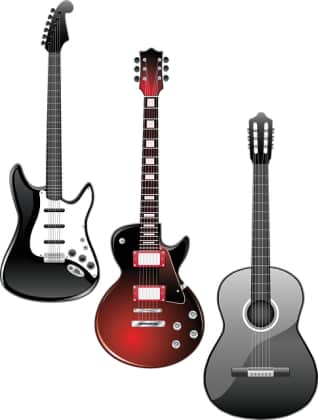
However, using a piano, or even drum VSTs, Synth VSTs or a MIDI controller, can certainly be a good starting point for someone who feels extremely comfortable with them.
But start with what you’re good at, create a good foundation for the song and then add the rest from there.
3. Go for a walk
I’m sure you’ve had this happen to you multiple times;
You say “ok, now it’s time to write a song”, and you sit down at your desk, grab your guitar, piano, or whatever instrument you play aaand…
Nothing happens. You can’t think of a single line, riff, chord progression, nothing.

This also happens to me when I need to come up with new ideas about anything, not just music composition.
I can’t just tell my brain to get creative. In fact, as soon as I WANT to be creative, the creative juices just won’t flow.
Going for a walk does wonders in this regard.
Just moving around and trying not to think about anything for a while makes something in my head click and I start coming up with loads of good ideas.
It’s very similar to studying while walking since you can concentrate a lot better for some reason.
Now, all of this is completely useless if you can’t recall all the ideas you had while you were out there walking.
So, remember to always take your phone with you to be able to record.
BUT don’t use the phone for anything else, don’t check messages, Facebook, or anything, since this will do more harm than good as far as creativity goes.
4. Take a long Shower
I know what you’re thinking… “Singing in the shower won’t help me write better songs”, right?
However, taking a shower is very similar to taking a walk in the sense that you’re doing something completely unrelated that doesn’t require too much of your attention, allowing your creativity to come through.
You don’t necessarily need to sing, but more ideas will come up in the shower than just while sitting around at home or in your bedroom, and that is something that definitely happens to me, so I speak from experience.
Again, you should find a way to document all your ideas, so take your cellphone with you… not IN the shower, silly! Just have it record somewhere in the bathroom and you’re set.
5. Set a Time Limit
Setting a limit on how much time you have to write a song can be beneficial.
The reason for this is that if you know that you have the entirety of the day to write, you probably won’t do it or you will end up procrastinating on something else.
What I mean by this is that if you force yourself to write a song in one hour, you’ll probably get it done. However, if you give yourself five hours, you will probably use up those whole five hours and not get too much farther.
In many cases what ends up happening is that you overthink it too much and end up second guessing every line, every chord progression, riff, etc.
Having a shorter time-frame helps you create something that’s more congruent more quickly without wasting time on unnecessary stuff.
It’s very similar to scheduling your work day; if you only give yourself two hours to do task “A” and two hours to do task “B”, you will find a way to finish both tasks on time.
6. Go looking for Inspiration
You know how people always say that music needs to come from the heart? Well, if you can do that and if you can talk about your personal stories and experiences, then sure!
However, it’s rare for anyone to have so many song-worthy life experiences.
This is why it may be useful to search for inspiration elsewhere, and not just from our own life experiences.
Watching movies, talking to your friends and family, or even watching the news for any kind of story can help you come up with a good song.
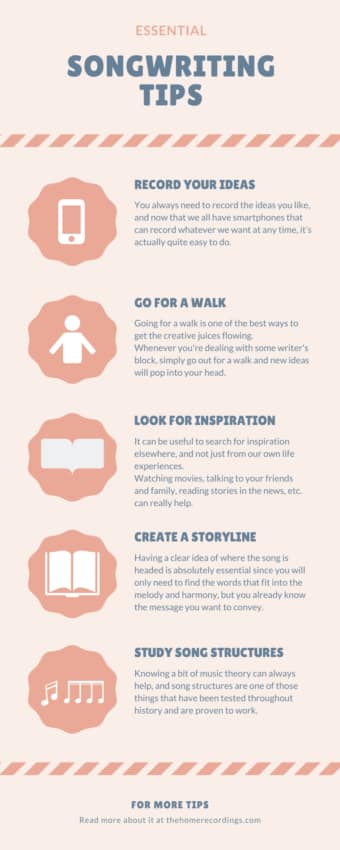
A good example of this is “She’s leaving Home” by the Beatles, where John and Paul read the story of a girl who left home in the newspaper and took the inspiration from there.
This is certainly something you too can do, just don’t think that you need to write about yourself or your own experiences for the song to be good.
7. Listen to similar music to find ideas
Some of the best ideas/songs I ever came up with were while out for a walk right after listening to some of my favorite songs.
What happens is that some parts of those songs just linger inside your head and you start transforming them into something different while adding your own style.
After a while you end up coming up with a whole new song that’s completely different, yet still seems to be awesome!
Basically, what I’m saying is, and this exactly what I talked about in the previous point, that you should find inspiration wherever you can.
8. Create a Storyline
Writer’s block is one of the most frustrating things you’ll have to deal with when composing your songs, but there’s one thing that often works for me which is having a clear idea of what I want to convey.
I try to create the whole storyline in my head and then I simply try to find the words that help me express that in a way that fits the harmony and melody.
This may not be the best approach for everyone, but it certainly works for me because I end up having a clear idea of where the lyrics should be heading.
This also brings me to my next point, which is…
9. Don’t be too literal, leave things open for interpretation
You may have noticed that most lyrics you hear aren’t completely straight to the point, right?
In fact, they tend to have a lot of metaphors, or maybe even phrases that don’t make too much sense on their own, which is a good way of letting each listener find different meanings in those lyrics.
I always do struggle with leaving things open for interpretation, and for some reason I try to get the message across as clearly as I can. I think it’s because I fear that people won’t understand it otherwise.
But this absolutely makes the song boring as hell, so try not to be too literal!
Now, let’s get into the more technical side of writing music…
10. Learn Basic Rhyming
Learning the basic rhyming structures is absolutely essential.
There are free verse styles that don’t rhyme at the end at all, however in most cases the last word at the end of every phrase rhymes with another word from a previous one.
Rhyming keeps the listener interested, it’s what usually helps the lyrics feel more congruent, which is why you could try out different rhyming patterns and see if one fits the song you’re working on.
Here are some of the basic rhyming structures
Structure: AAAA
The last word of the sentence always rhymes with the last word of the previous one.
Example:
I realized it was half past four
When I, quite late, ran out the door.
My history class I so abhor,
But I missed two sessions the week before.
Structure: ABAB
This is probably the most common rhyming structure used in most commercial songs out there.
In this case, the first and third phrases rhyme with each other, and the second and fourth ones rhyme with each other.
A great example is “I’m not the only one” by Sam Smith.
You’ve been so unavailable
Now sadly I know why
Your heart is unobtainable
Even though Lord knows you kept mine
There are many other rhyme schemes that you could take advantage of, however I’m not going to list every single one of them here since it’s not the point of the article.
If you want to learn more about them, read this article by Literaryadvices.net that explains everything thoroughly.
Moving on…
11. Study song structures
Just as important as rhyming structures, or even more important, is the structure of the actual song.
A song’s structure is basically how a song is organized, using a combination of different structures like the Intro, the Verse, Chorus, Bridge, and the Outro.
Here’s a breve description of all of them;
Intro: The intro is there to catch the listeners attention without being too overwhelming. It starts of slow and not as up-tempo and it creates interest.

Verse: The Verse tells a story and it’s where this story develops. It sets the context, pulls the listener in, and it changes throughout the tune.

Chorus: The Chorus is the hook of the song, or in other words, it’s the catchiest part of it. It repeats over and over and it’s generally simple enough so that it sticks and people can remember it.

Additionally, the chorus is often the title of the song as well.
Bridge: The bridge is optional, not all songs have it.
It should have a different chord progression, change keys, etc. and it’s designed to renew interest and make the song feel less monotonous.

The bridge normally comes right before the last Chorus of the song.
Outro or Coda: The outro is basically the end of the song. It’s where the same line (chorus or just a simple line) or instrumental part repeats over and over while the sound fades out.

What are the most common song structures?

As far as pop songs go, they mostly follow a structure that’s worked for years and that is a proven recipe for success across all genres.
These are the AABA and ABABCB structures.
A: Represents the Verse.
B: Represents the Chorus.
C: Represents the Bridge.
This simply means that in an AABA structured song you’d have two verses followed by a chorus and then one last verse.
And with the ABABCB structure you’d have a verse, chorus, verse, chorus, bridge, and lastly another chorus.
The ABABCB method is the one most pop songs currently use, some examples are;
- “Thinking out loud” by Ed Sheeran
- “What it takes” by Aerosmith
- “High and Dry” by Radiohead
- “Hot N Cold” by Katy Perry
Learning the structure of your favorite songs can help you achieve similar results, which is why I think that it’s hugely important to study them.
Additionally, already having a structure helps you organize the writing process and not get lost.
Again, if you want to learn more about all the different song structures out there, then make sure to check out this post by songwriting.net.
12. Use software to help with the creative process

Ok, first of all… I get it!
Most of you might be thinking that using software to make the writing process easier is just some form of cheating, right?
But in all honesty, I don’t think so.
These kinds of software/websites just help you come up with new ideas, which you can then transform into something better, and that’s the whole point!
Masterwriter for example, allows you to search for words and it will suggest other ones that rhyme with it, or that are synonyms, etc.
You can even search for phrases and it will do the same.
The same goes for the harmony of the song since there are websites like Autochords that allow you to select a key and a style of music and they will randomize chords in a way that makes sense.
Of course, don’t just rely on these tools to come up with lyrics and harmonies, but rather use them when you’re running out of ideas and are starting to get stuck.
Other free alternatives you should check out are;
- Chordbot Lite: This is a free mobile app that allows you to arrange and test out chords and chord-progressions.
- Rhymezone: This is a free website that helps you find rhymes for songwriting.
13. Study Songwriting online
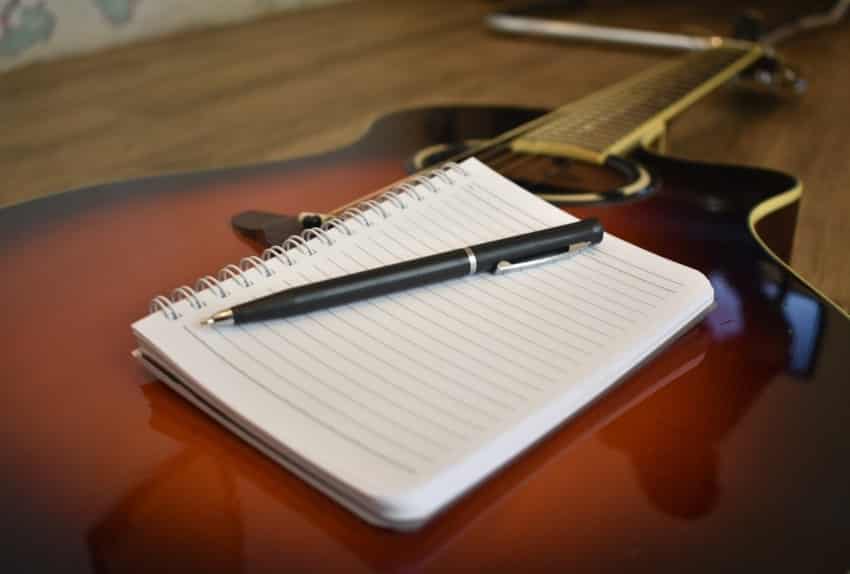
Now, before you think that I’m telling you to spend 5 years studying music theory and composition and leave, let me tell you this.
The basics of writing music aren’t too complex, and you can learn how to do this either for free or for just a couple bucks.
You can find loads of tutorials on YouTube or you could enroll in some online courses where you will learn all the basics.
Here are a couple courses on Skillshare that you can snag for free by using the free trial (You will be asked for your card details but you can cancel the subscription one the trial is about to end and you won’t be charged).
I listed these courses because you can get them for absolutely free.
However, I’ve also written a huge list about the best music production courses where you’ll also find some related to composition.
Make sure to give that post a read if you’re interested.
14. Write a Ton of songs
Believe me, your first songs are probably going to be terrible… and I mean TERRIBLE!
But writing songs is something that you’ll learn over time and you will have to write as many as you can and train the skill.
Ed Sheeran says that he writes about six songs a day, which definitely is a lot!
This will do two things;
On the one hand you’ll become better at writing, but the reality is that not all the songs you come up with are going to be good.
So, imagine if you write 5 a day, then there’s a serious chance that you’ll write a couple over the course of a year that are simply excellent, but apart from just learning the skill you also are going to need volume.
Download the free Songwriting Checklist
I’ve created this checklist that you can download which should help you out a bit both in terms of getting ready to write your songs as well as judging the final product to see how well you did.
You can find the Songwriting Checklist here.
Conclusion
I know that applying each of these tips isn’t that easy to do in one go, so I’d recommend you to start with some and then include the other ones as you get used to them.
Songwriting is definitely hard most of the times, unless you just happen to get inspired and you’re in one of those situations where the words just seem to write themselves, like it happened to Gary Moore with the song “Still got the Blues”.
But if you practice, record all your ideas, study a bit of music theory, and try to compose as many songs a day as possible, I’m sure that you’ll eventually compose a couple awesome songs!
Have a wonderful day!
